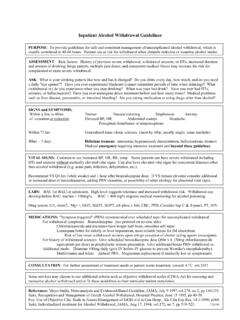Transcription of Practical Oral Care for People With Down Syndrome
1 DEPARTMENT OF HEALTH AND HUMAN SERVICES l NatioNal iNstitutes of HealtH l National institute of Dental and Craniofacial Research Practical Oral Care for People With Down SyndromecontentsHealtH CHallenges In down Syndrome and strategIes for Care2 .. Intellectual disabilityBehavior management3 .. Medical conditionsCardiac disordersCompromised immune systemsHypotonia4 .. SeizuresHearing loss and deafnessVisual impairmentsoral HealtH problems In down Syndrome and strategIes for Care5 .. Periodontal diseaseDental caries6 .. Orofacial featuresMalocclusionTooth anomalies7 .. Trauma and injuryaddItIonal readIngsProviding oral care to People with Down Syndrome requires adaptation of the skills you use every day.
2 In fact, most People with mild or moderate Down Syndrome can be successfully treated in the general practice setting. This booklet will help you make a difference in the lives of People who need professional oral Syndrome , a common genetic disorder, ranges in severity and is usually associated with medical and physical problems. For example, People with this developmental disability may have cardiac disorders, infectious diseases, hypotonia, and hearing loss. Additionally, most People with this disorder have mild or moderate intellectual disability, while a small percentage are severely affected. Developmental delays, such as in speech and language, are professional treatment and daily oral care at home can allow People with Down Syndrome to enjoy the benefits of a healthy Challenges in down Syndrome and strategies for CarePeople with Down Syndrome may present with mental and physical challenges that have implications for oral care.
3 Before the appointment, obtain and review the patient s medical history. Consultation with physicians, family, and caregivers is essential to assembling an accurate medical history. Also, determine who can legally provide informed consent for DISAbILITy. Although the mental capability of People with Down Syndrome varies widely, many have mild or moderate intellectual disability that limits their ability to learn, communicate, and adapt to their environment. Language development is often delayed or impaired in People with Down Syndrome ; they understand more than they can verbalize. Also, ordinary activities of daily living and understanding the behavior of others as well as their own can present challenges.
4 Listen actively, since speaking may be difficult for People with Down Syndrome . Show your patient whether you understand. Talk with the parent or caregiver to determine your patient s intellectual and functional abilities, then explain each procedure at a level the patient can understand. Allow extra time to explain oral health issues or instructions and demonstrate the instruments you will use. Use simple, concrete instructions, and repeat them often to compensate for any short-term memory MANAgEMENT is not usually a problem in People with Down Syndrome because they tend to be warm and well behaved. Some can be stubborn or uncooperative, but most just need a little extra time and attention to feel comfortable.
5 Gaining the patient s trust is the key to successful treatment. Talk to the caregiver or physician about techniques they have found to be effective in managing the patient s behavior. Share your ideas with them, and find out what motivates the patient. It may be that a new toothbrush at the end of each appointment is all it takes to ensure cooperation. Schedule patients with Down Syndrome early in the day if possible. Early appointments can help ensure that everyone is alert and attentive and that waiting time is reduced. Set the stage for a successful visit by involving the entire dental team from the receptionist s friendly greeting to the caring attitude of the dental assistant in the operatory.
6 Provide oral care in an environment with few distractions. Try to reduce unnecessary sights, sounds, or other stimuli that might make it difficult for your patient to cooperate. Many People with Down Syndrome , however, enjoy music and may be comforted by hearing it in the dental office during treatment. Plan a step-by-step evaluation, starting with seating the patient in the dental chair. If this is successful, perform an oral examination using only your fingers. If this, too, goes well, begin using dental instruments. prophylaxis is the next step, followed by dental radio graphs. Several visits may be needed to accomplish these tasks. Try to be consistent in all aspects of providing oral health care.
7 Use the same staff, dental operatory, appointment times, and other details to help sustain familiarity. The more consistency you provide for your patients, the more likely that they will be cooperative. address your patient directly and with Syndrome Comfort People who resist oral care and reward cooperative behavior with compliments throughout the appointment. Use immobilization techniques only when absolutely necessary to protect the patient and staff during dental treatment not as a convenience. There are no universal guidelines on immobilization that apply to all treatment settings. Before employing any kind of immobilization, it may help to consult available guidelines on federally funded care, your State department of mental health/disabilities, and your State Dental Practice Act.
8 Guidelines on behavior management published by the American Academy of Pediatric Dentistry ( ) may also be useful. Obtain consent from your patient s legal guardian and choose the least restrictive technique that will allow you to provide care safely. Immobilization should not cause physical injury or undue CONDITIONS. Though their average life expectancy has risen to the mid-50s, People with Down Syndrome are still at risk for problems in nearly every system in the body. Some problems are manifested in the mouth. For example, oral findings such as persistent gingival lesions, prolonged wound healing, or spontaneous gingival hemorrhaging may suggest an underlying medical condition and warrant consultation with the patient s DISORDERS are common in Down Syndrome .
9 In fact, mitral valve prolapse occurs in more than half of all adults with this developmental disability. Many others are at risk of developing valve dysfunction that leads to congestive heart failure, even if they have no known cardiac disease. Consult the patient s physician if you have questions about the medical history and the need for antibiotic prophylaxis ( ).COMPROMISED IMMUNE SySTEMS lead to more frequent oral and systemic infections and a high incidence of perio dontal disease in People with Down Syndrome . Aphthous ulcers, oral Candida infections, and acute necrotizing ulcerative gingivitis are common. Chronic respiratory infections contribute to mouth breathing, xerostomia, and fissured lips and tongue.
10 Treat acute necrotizing ulcerative gingivitis and other infections aggressively. Talk to patients and their caregivers about preventing oral infections with regular dental appointments and daily oral care. Stress the importance of using fluoride to prevent dental caries associated with xerostomia. Use lip balm during treatment to ease the strain on your patient s affects the muscles in various areas of the body, including the mouth and large skeletal muscles. When it involves the mouth, it leads to an imbalance of forces on the teeth and contributes to an open bite. If the muscles controlling facial expression and mastication are affected, problems with chewing, swallowing, drooling, and speaking can result.













